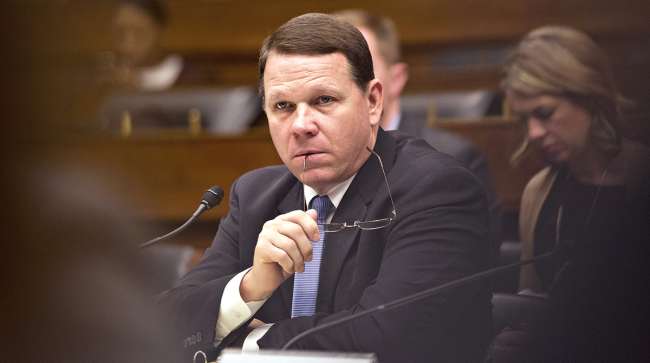Senior Reporter
Rep. Sam Graves Highlights Push to Streamline Permitting Process

[Stay on top of transportation news: Get TTNews in your inbox.]
Policies aimed at expediting the permitting process related to big-ticket infrastructure projects would enhance connectivity along freight and commuter networks, Rep. Sam Graves, the top Republican on the House transportation panel, recently indicated.
“Further impeding our progress on fixing our infrastructure is miles of regulatory red tape. Over the last 64 years, the federal bureaucracy in Washington has exploded, and the number of burdensome regulations that delay critical infrastructure projects and cost taxpayers millions in endless studies and inefficient reviews has dramatically increased,” Graves, from Missouri, said Feb. 13.
“The result is that not only do we have a smaller budget to fix our infrastructure, but we’ve got a lot of red tape that keeps our taxpayer dollars from going as far as they should,” he added. “We’ve got to fix this, too, by streamlining review processes to get projects done on time and on budget.”
Graves’ sentiment has been echoed by fellow Republicans on Capitol Hill, and it’s a resounding endorsement of the Trump administration’s push to update guidance of a federal environmental law long-criticized by commercial interests and the construction sector.
In its fiscal 2021 budget request to Congress, the administration noted its ongoing directives that take aim at the environmental permitting process, such as a vision for a “one-federal-decision” policy for projects. Transportation Secretary Elaine Chao highlighted the efforts in a call with reporters Feb. 10: “The proposal also includes legislative revisions that would reduce the regulatory and administrative burdens that all too often impede progress of construction projects.”
In part two of a two-part exploration of autonomous technology today, our latest RoadSigns podcast revisits conversations with Chuck Price of TuSimple and Ognen Stojanovski of Pronto.ai. Hear them discuss a palatable Level 2 version of trucking autonomy. Listen to a snippet above, and to hear the full episode, go to RoadSigns.TTNews.com.
The White House announced last month it would focus on the National Environmental Policy Act and propose rules meant to streamline the environmental permitting process. The proposed rulemaking would incorporate a one-federal-decision approach to permitting, among other updates. The public comment period on the proposal ends March 10.
“The NEPA process and related litigation has slowed or prevented the development of new infrastructure and other projects that required federal permits or approvals,” the administration explained in the Federal Register on Jan. 10.
More than 100 congressional Democrats concerned about the proposed rulemaking recently requested a longer deadline to accommodate public input. In a letter to the Council on Environmental Quality, Democrats urged the agency to “extend the comment period to a duration commensurate with the scope and gravity of changes that CEQ proposes.”
“Given that this is an unprecedented rewrite of the existing regulations and will impact proposed federal agency decisions for years to come, any public period less than six months would be unreasonable,” Democrats wrote to CEQ Chair Mary Neumayr. “We should do more, not less, given what we now know about how our activities impact the human environment.”
Signatories included Rep. Raul Grijalva (D-Ariz.), chairman of the Natural Resources Committee, Rep. Peter DeFazio (D-Ore.), chairman of the Transportation and Infrastructure Committee in the House and Sen. Tom Carper (D-Del.), ranking member on the Environment and Public Works Committee.
Democrats Letter by Transport Topics on Scribd
This month in Colorado, the Trump administration hosted the first public session on NEPA’s looming changes. Proponents of the law warned changes to federal guidelines could harm flora and fauna in local communities. Meanwhile, groups such as the U.S. Chamber of Commerce tout the administration’s goal.
“We support NEPA’s requirement for environmental reviews and public input. But too often, the current rules are used as a tool to obstruct important projects, such as highways, bridges, public transit and even renewable energy projects,” Chamber CEO Tom Donohue said. “Reducing delays and uncertainties associated with infrastructure investment and related projects will allow businesses to plan and invest with confidence while enhancing economic productivity and supporting more and better-paying jobs throughout the country.”
Want more news? Listen to today's daily briefing:




